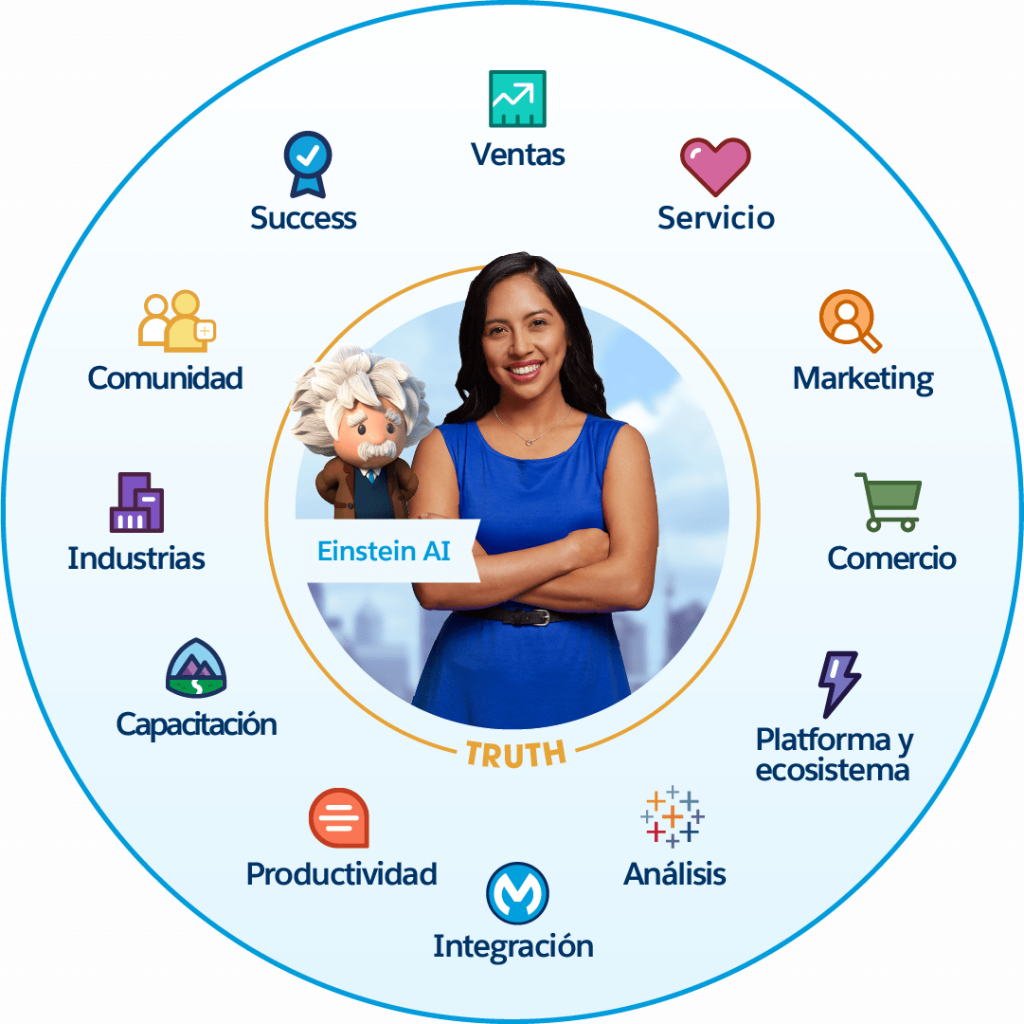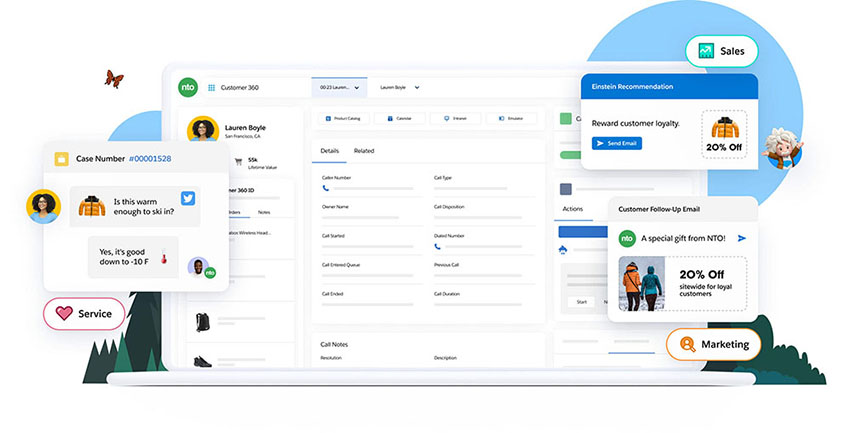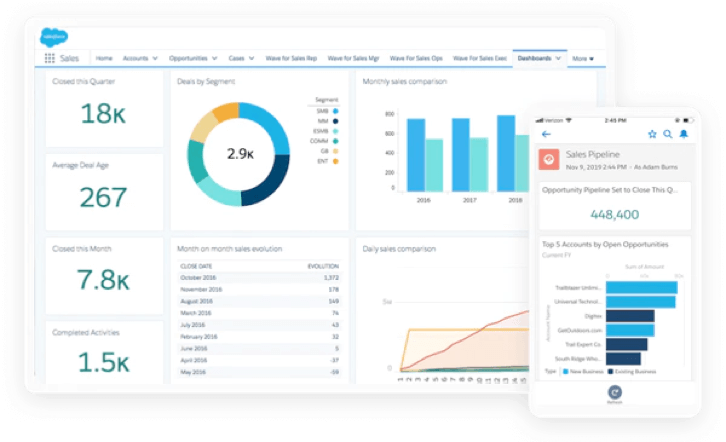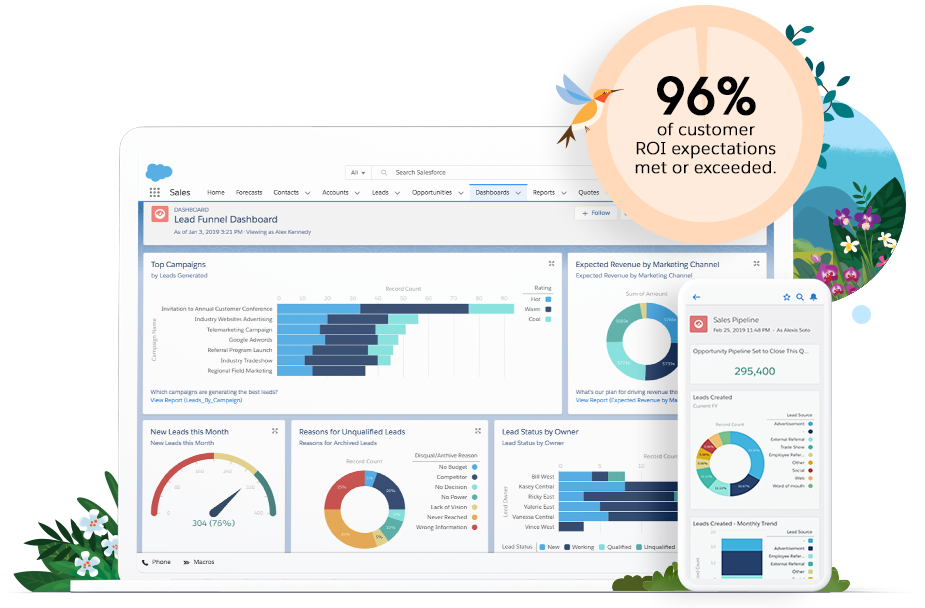
These features make Salesforce the best CRM for companies
January 13, 2023
Table of contents
Quick Access

In the days of the caves, companies managed their clients manually, through folders, lists, and notebooks. Getting any data could take hours, and sheets and folders were always at risk of being lost or damaged, creating a somewhat cumbersome workflow. All this panorama changed with the arrival of CRM software to companies.
Just at the end of the 80s, Jon Ferrara developed a system called SFA (Sales Force Automation), considered the first software for managing the sales force of companies. But the term CRM was created in the 90s by Thomas Siebel, thus formalizing the arrival of Customer Relationship Management or what is the same, the platform for managing the relationship with customers.
It was in 1999 that Salesforce was born, the first company to offer a powerful CRM, which combined all the best of OSS with cloud functions, all under an environment that was easy to learn and manage.
Today, Salesforce is not just a simple CRM: it has become a whole platform to handle everything related to customers, sales, marketing, and services. Everything needed by the sales, marketing, and customer service teams is concentrated in the same system.
Table of Contents
Most Attractive Salesforce CRM Features
Most Important Features of Salesforce CRM
- Efficient integrations
- Smart assistant
- Real-time analytics
- Slack integrated
Modules Available in Salesforce CRM
-Marketing
- Sales
- Customer service
Most Attractive Salesforce CRM Features
Now we will talk about those characteristics that make Salesforce a very attractive platform for businesses:

- Manage customer information and allow sales agents to track the most important data to increase retention and recurrence.
- It allows the more effective follow-up of leads or prospects while automating and streamlining repetitive tasks.
- It is customizable and adjusts to the particular context of your business.
- It expands and grows as your business develops.
- Proposes recommendations to improve the management of your business and customers.
Most Important Features of Salesforce CRM
EFFICIENT INTEGRATIONS
Through Mulesoft, Salesforca CRM integrates all the data, both inside and outside your CRM. You won't have to jump from one system to another to verify all the information you need from your customers.

SMART ASSISTANT
Salesforce CRM makes its intelligent assistant called Einstein AI available to companies, which helps automate tasks and provides suggestions on the most efficient steps for the business from the platform.
"It is a mobile tool that gives you greater agility and opportunity to consult and have updated information at all times", said Santiago Suinaga, VP of Operations and Commercial Strategy.

REAL TIME ANALYTICS
A very important aspect in any business are reports and analytics, since they give a clear picture of how the company is doing, what can be improved and the strategies that are working. Salesforce CRM is software that automates the analysis of all your data and takes advantage of Artificial Intelligence to help companies make decisions. All of this is made possible by the functionality of Tableau Analytics.
INTEGRATED SLACK
Slack is one of the communication tools most used by work teams around the world, and it is integrated into Salesforcr CRM. In this way, the sales, customer service and marketing teams can always be connected to each other.
Modules Available in Salesforce CRM
Marketing
It is a tremendous opportunity that there is a marketing module in Salesforce CRM, since agents will be able to access customer sales cycle data to make more effective marketing campaigns and strategies that are in line with the interests of customers and leads.
"It allows knowing customers in depth, creating innovative campaigns, with relevant messages and connected to the right context," Salesforce said in its documentation.

The following marketing tools are integrated into this module:
Email Studio: to create effective email campaigns.
Marketing CloudCustomer Data Platform: unifies, segments and analyzes customer data.
Mobile Studio: to customize interactions for notifications, text messages and chat.
Marketing Intelligence: uses analysis and intelligence tools to improve decision making.
Marketing Cloud Personalization: improve customer experience and user interaction.
Marketing Cloud Account Engagement: unifies the marketing and sales areas.
Sales
It is the heart of Salesforce CRM, called Sales Cloud. It offers a broad and complete view of customers, making contact management much more efficient. It shows a history of the activities of each contact, which contacts are the most important, what are the interests of the prospects.
And speaking of prospects, this platform allows you to better manage sales opportunities, monitoring the lead at each stage, their interests, products, and quotes. Through the Relationship Intelligence functionality, agents will be able to anticipate the needs of users, offering them the ideal product.
Salesforce CRM also focuses on being a "lead generating machine." That is why it has the functionality of Salesforce Engage, which is used to create personalized sales campaigns by marketing. Likewise, it has an area that is exclusive for lead tracking and marketing automation, to generate and qualify potential customers.

Customer service
It is another of the essential modules that Salesforce CRM offers, since it is involved in customer loyalty and retention. Through automated workflows powered by Artificial Intelligence, agents can provide personalized service to customers.
Through Service Cloud, you can serve user messages sent from any channel, quickly process customer interactions, thus driving problem resolution and increasing sales.
The simplification of flows and automation translates into faster, more personalized and efficient service for users, increasing customer satisfaction and meeting their expectations and needs.
What Salesforce CRM does is unify all the departments and processes of your business, so that the management of clients and leads is the most efficient and product for the company.
Need Salesforce CRM experts? At Rootstack, we have +10 years of experience supporting companies in their digital transformation. Contact us!
We recommend you on video
Related Blogs

Using Akismet in Drupal 10: Protect Your Forms from Spam

How to Create a Simple Drupal Webform?

How to Find a Drupal Development Company?

Examples of Websites Built with Drupal
.jpg)
How to Choose a CMS?
